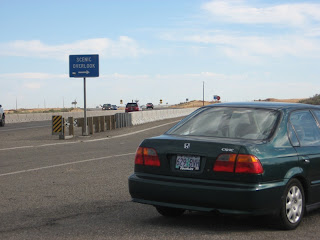1. How are you going to get there?
a. Plane (quick, affordable)
b. Train (hey, it's an option! check for routes and specials)
c. Automobile (do you need a car in your new city? will your car make it there?)
d. Bicycle/On foot (well..you never know)
This decision will always come down to cost and what you want to bring with you. If you have a car, you are either driving yourself there, towing it behind a moving van, or selling it. Option d. is just for my own amusement but it has been done before.
2. What is the route you will take?
a. What do you want to see while on the road?
Make a initial route of how you will get to the new place and then start looking for fun things along the way. This can include national parks, weird roadside attractions, world renowned doughnut places (oh, that's just me?) and more.
b. Weigh costs and options as you do start to make your route. Can you stay with friends/family? Is it worth it to go one way vs. a different route? Also consider traffic (holiday weekends, for example) and weather (snow and hot, hot weather both have their caveats).
3. What are you taking with you?
This will also depending on how you are getting to your new place. The big thing with "stuff" is determining was it worth moving and what is completely and easily replaceable. Anything bought at a big box store (IKEA, Target, etc.) can be easily replaced. If it is truly a special something that you want to have with you then that is worth it. Books are a more personal decision but can be replaced easily and cheaply most of the time. It may come down to having an absolute non-negotiable pile and then beginning to see how you will move everything.
a. Donating: check around for places to donate in addition to the typical Goodwill/Salvation Army. Books can often be donated to libraries and food is always welcomed at Food Banks or shelters.
b. Selling: Craigslist is a great way to get rid of stuff face, if fairly priced, as well as eBay for more collector or specialty items. Consignment/resale stores are great for clothes but you won't make much money.
c. Pawning off stuff to co-worker: Yep.
d. Storage/moving "pods" options: Usually pods are pretty expensive but will be worth it if you need to store things for a while in between places.
e. Mailing: Mailing stuff can be very expensive to choose wisely on what you send. Typically, I try to send the bigger but lighter items (soft, fluffy blankets, baking pans, etc.) that aren't too expensive and books. If you can box all of the books/media together, you can send the box media mail rate which is very cheap and will get to the new place between 7-14 days.
4. What is the timeline to get to the new place?
If you have a date that you must be in the new city, work backwards to figure out when you need to leave. Always give yourself a small buffer of days, if possible, in case anything happens or you decide to extend your trip.
5. The money factor.
So, how much money you got? Take all of the following into consideration when doing a rough budget for moving.
a. Cost of moving your stuff (see above)
b. Cost of moving YOU
c. Setting up the new life (security deposits, rent, cable/internet, etc.)
d. Closing out the old life (rent and leases, changing driving license/car tags and registration)
e. Incidentals (car repair, gas, etc.)
____________________________________________________________________
This list is just a start of things to think about but also the many, many options available to you when moving. Most of these can be applied to any moving situation but as my apparent expertise has come in long distance moves, I thought I would share my usual approach with everything.
Some websites that I rely on for information, apartment hunting, and more:
www.city-data.com/ has forums that are AMAZING for asking questions and learning more about the city. Most questions on there deal with good neighborhoods to live in, school districts, and traffic patterns (really important when considering where to live in relation to work/social events).
www.padmapper.com/ & Craigslist
These are great places to start the apartment hunt. While renting a place sight unseen isn't ideal, it does happen. I always do a tremendous amount of research on this using the city-data website and craigslist to start and breaking it down into property management companies and rental places and then cross checking that with reviewing sites and Better Business Bureau. It sounds like a lot of work but trust me, it has saved me from making a bad choice several times. I rented my last two places sight unseen and they were absolutely wonderful.
Any other tips and tricks? Any questions?



Hi, I stumbled on this from Pinterest, and it looks like we are making a very similar move as you did - Ann Arbor to Portland. Do you have a specific post dedicated to that trip?
ReplyDeleteHi Erica,
DeleteI actually have a lot of posts dedicated to that trip! If you look under the August 2010 blog postings, you'll see a bunch of road trip check-ins but there are also two road trip reviews:
http://cannonapril.blogspot.com/2010/08/road-trip-review.html
http://cannonapril.blogspot.com/2010/08/road-trip-review-ii.html
I apparently just stopped there! Feel free to ask any questions you might have as the planning stages happen. I have done the west coast to midwest trip, midwest to southeast and then south east right back to Portland.
Do you know any sites like www.movety.com that we can browse appartments for rent?
ReplyDeleteJust using Craigslist and city-data.com as starting points. Those are my most useful sites!
Delete